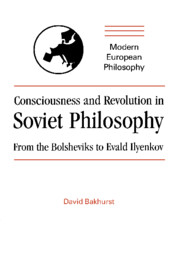Book contents
- Frontmatter
- Contents
- Acknowledgments
- A note on translation, transliteration, and references
- 1 Introduction
- 2 Deborinites, Mechanists, and Bolshevizers
- 3 Vygotsky
- 4 Lenin and the Leninist stage in Soviet philosophy
- 5 Ilyenkov and dialectical method
- 6 The problem of the ideal
- 7 The socially constituted individual: Rethinking thought
- 8 In conclusion
- References
- Index
1 - Introduction
Published online by Cambridge University Press: 10 December 2009
- Frontmatter
- Contents
- Acknowledgments
- A note on translation, transliteration, and references
- 1 Introduction
- 2 Deborinites, Mechanists, and Bolshevizers
- 3 Vygotsky
- 4 Lenin and the Leninist stage in Soviet philosophy
- 5 Ilyenkov and dialectical method
- 6 The problem of the ideal
- 7 The socially constituted individual: Rethinking thought
- 8 In conclusion
- References
- Index
Summary
Why study Soviet philosophy? The best reason to study another philosophical tradition is that philosophy itself will benefit; there could be no stronger incentive to consider the work of Soviet philosophers than the prospect of enlarging the compass of philosophical knowledge in general. The study of Soviet philosophy, however, is rarely advocated on these grounds. On the contrary, the prevailing opinion in the West is that philosophers in the Soviet Union have produced nothing of intellectual substance. It is usually believed that what has passed for philosophy in the USSR is merely the elaboration of Marxist–Leninist doctrine, a mixture of platitudes and non sequiturs that, at least until recently, formed the ruling ideology of the Soviet Communist Party. “Soviet philosophy,” it is sometimes joked, must be a contradiction in terms.
The prevalence of such views explains the character of the small body of Western literature on Soviet philosophy. The study of Soviet philosophy has traditionally fallen to scholars of a “sovietological” orientation, who have envisioned their primary task as the analysis of an alien superpower's ideology. They have thus sought to codify the official philosophy of the Soviet establishment, avoiding lengthy discussion of any particular Soviet thinker's ideas. The writings of the more inventive Soviet philosophers are sometimes cited to show how Marxist–Leninist dogma can be cleverly interpreted to preserve a semblance of intellectual activity, but it is seldom argued that these writings make a contribution to philosophy as a discipline. It is hardly surprising, therefore, that the deliverances of philosophical sovietology have had little more than curiosity value for Western philosophers.
- Type
- Chapter
- Information
- Consciousness and Revolution in Soviet PhilosophyFrom the Bolsheviks to Evald Ilyenkov, pp. 1 - 24Publisher: Cambridge University PressPrint publication year: 1991

